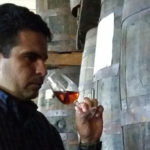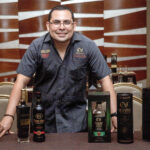Cellar Master & Master Blender at Braud & Quennesson Rum: XAVIER PIRON
TRL: Who is XAVIER PIRON?
I grew up in Bretagne, in the West of France. My interest in the world of wine began after I finished secondary school. I went straight into a course in Bretagne to learn about analytical tasting and the French terroir. My studies led me to Scotland at the Scotch Malt Whisky Society. It was love at first sight for Whisky and the spirits industry.
Later, my travels took me to Guadeloupe, where I joined the Montebello distillery team in 2019 as a Sales Ambassador. This first experience in a distillery was a revelation for my growing passion for the rum industry. In 2021, I was hired by a new distillery, Papa Rouyo, which highlights the work of the cane growers and pot still distillation. I joined the team as Cellar Manager and Brand Ambassador, during which I discovered my growing passion for cellar work, creating batches, and monitoring aging.
After this very rewarding experience in Guadeloupe, I returned to France for a year to work as a distiller with the Bordeaux Distilling Company. This gave me an insight into the production of other spirits such as Whisky, Gin, and molasses rum! In 2024, I had the opportunity to join the Usine du Marin, which produces Braud & Quennesson rums in the Southern part of Martinique and I’ve become Cellar Master and Master Blender.
TRL: What does the rum mean to you? What made you fall in love with rum and when did it happen?
I really got into the Rum industry in 2018 when moving to Guadeloupe, where I discovered a rich world with a long-standing heritage and men and women perpetuating a century-old tradition by producing a unique cane eau-de-vie. To me, it has re-established its whole potential in the spirits world.
TRL: Three essential characteristics that define the rum according to your perspective.
I would say: Heritage, Savoir-faire, and Diversity.
TRL: What is the most important contribution you have made in the rum industry?
My experience at Papa Rouyo Distillery allowed me to introduce the relevance of the notion of terroir and above all human skills: without sugarcane farmers, there would be no cane, and therefore, no rum. Understanding their work and providing support for the study of climate, cane varieties, and soil geology has been one of my most exciting assignments. I was involved in creating Farmer’s batch, which highlights the work of a single man on his plots of land in a single bottle.
The project was to link the world of wine and the rum one, which are actually quite similar after all.
TRL: Benefits that the rum industry has given you.
The rum industry has allowed me to meet passionate people. It has also given me the opportunity to learn about the art of cellaring and creation, which I’m now involved in.
TRL: What’s another thing you are passionate about besides rum? Why?
I am truly passionate about traveling and discovering cultures. I genuinely believe in the richness of learning from others.
TRL: What is your favorite place for drinking rum?
Anywhere, but with friends! Above all, rum is a spirit of sharing. I often get together with colleagues or friends who are enthusiasts to taste rums and talk about our mutual feedback.
TRL: Favorite drink + Recipe
Pure rum, sometimes in ti-punch or Shaked in Daiquiri, a cocktail made out of lime, sugar, and ice that really brings out the best in white rum.
TRL: Why is it important to educate the rum consumer?
Rum has become a very popular drink, which can be used on several occasions. Everyone can find its rum according to the moment. The real education is to tell about the people making it, from those working in the fields to the production. In a word, tasting rum is about discovering and sharing.
TRL: Any tips to train the palate and taste a good premium rum?
It’s important to take time to analyze. The visual-olfactory-gustatory rule will always be a good start to understanding the rum in the glass. Observing tears of rum can give you information about the structure. Then, placing the nose in the right glass spot first, in the upper part, will allow you to get the rum profile. Then, slowly chewing in your mouth will help you get the texture and the range of aromas.
TRL: How can the rum contribute to improving the crisis in some countries?
To be honest, it’s hard to answer this, but what can be said is that the rum industry has created jobs, as in Grenada with CaneCo. The rum industry is booming and attracts more people now with increasing opportunities around the world.
TRL: Is the commitment to sustainable development the key to success for the permanence of the rum industry in the world? Why?
More and more rum distilleries are setting up a dedicated sustainable development research and unit within their structure. The project of Braud & Quennesson is to become a distillery in a few years’ time, the whole construction of this project revolves around sustainable development from the choice of materials for the building to the energy system for the boilers, everything is designed to produce the greenest rum possible.
TRL: Who would like to meet in the rum industry? What would you say to him/her?
There are a lot of people that I would like to meet, but if I had to quote someone, I would say that Mark Reynier is an inspiration, as he started with Bruichladdich and Waterford, then in Rum with Renegade, with a strong focus on Terroir. What he has brought to the industry is relevant to me.
TRL: What are your next goals in the rum industry?
My main goal is to keep learning. I’m going to take my new role very seriously and do my best to create great rums at Braud & Quennesson. It’s a young rum distillery with its unique terroir in the South of Martinique, giving us very sweet cane and very aromatic rums. I want to continue to meet inspiring people, learn from them, and continue to work every day with passion, along with my colleagues.
TRL: How can people learn more about you? Website? Social media page? I try to be active on my social networks, especially my Instagram account @xavier.piron.rhum to show those who are interested in what a typical day in the life of a Cellar Master is like!





